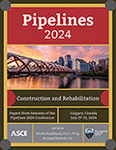Environmental Impacts of Emissions from Cured-in-Place Pipe Installation: Initial Results from a Case Study
Publication: Pipelines 2024
ABSTRACT
Cured-in-place pipe (CIPP) lining is a widely adopted method for infrastructure renewal, offering advantages, such as rapid installation and cost-effectiveness. However, concerns regarding the environmental impacts of volatile organic compound (VOC) emissions during the installation process have raised concerns over the CIPP method. The literature review conducted with this research indicated the need for stringent monitoring and management practices to mitigate adverse effects, emphasizing the importance of comprehensive evaluation protocols. This paper presents initial results from a case study focusing on VOC emissions, specifically investigating non-styrene polyester resins and water curing. The methodology involved air sampling using various equipments, including photoionization detectors (PID), summa canisters, passive worker sampler sorbent tubes, and method 18 cartridges, to capture emissions from CIPP activities. The preliminary findings indicate that non-styrene polyester resins do not exceed exposure limits set out by OSHA and the EPA. Future phases of this project will explore different resins and curing methods, with findings to be published in subsequent papers.
Get full access to this chapter
View all available purchase options and get full access to this chapter.
REFERENCES
Ajdari, E. B. (2016). Volatile organic compound (VOC) emission during cured-in-place-pipe (CIPP) sewer pipe rehabilitation (Doctoral dissertation, University of New Orleans).
Donaldson, B. M. (2012). Water quality implications of culvert repair options: vinyl ester based and ultraviolet cured-in-place pipe liners (No. FHWA/VCTIR 13-R2). Virginia Center for Transportation Innovation and Research.
Howell, J. M., Matthews, E., Matthews, J., Alam, S., Bednar, A., Laber, C., and Eklund, S. (2022). Styrene emissions in steam-cured CIPP: A review and comparison of multiple studies. Journal of Pipeline Systems Engineering and Practice, 13(1), 04021071.
Kaynak, B., and Elledge, W. Styrene? Not in My Ambient Air! A DC Water Case Study for Air Quality Monitoring and Testing during CIPP Installation at Soapstone Valley Park. In Pipelines 2023 (pp. 357–366).
Kampbell, E. (2009). Understanding environmental implications of CIPP rehab technology. Rehabilitation Technology, Underground Technology Cutting Edge Technical Information for Utility Construction and Rehabilitation, 2009.
Lee, R. K. (2008). “Risk Associated with CIPP Lining of Stormwater Pipes and the Release of Styrene.” Proceedings of the North American Society for Trenchless Technology (NASTT) NO-DIG Conference, NASTT, Dallas, TX, 2008; Paper E-1-05.
Matthews, J. C., Selvakumar, A., and Condit, W. (2012). Demonstration and evaluation of an innovative water main rehabilitation technology: Cured-in-place pipe (CIPP) lining. Water Practice and Technology, 7(2), wpt2012028.
NASSCO. (2020). Guideline for the Safe Use and Handling of Styrene-Based Resins in Cured-in-Place Pipe.
Teimouri Sendesi, S. M., Ra, K., Conkling, E. N., Boor, B. E., Nuruddin, M., Howarter, J. A., and Whelton, A. J. (2017). Worksite chemical air emissions and worker exposure during sanitary sewer and stormwater pipe rehabilitation using cured-in-place pipe (CIPP). Environmental Science & Technology Letters, 4(8), 325–333.
Tabor, M. L., Newman, D., and Whelton, A. J. (2014). Stormwater chemical contamination caused by cured-in-place pipe (CIPP) infrastructure rehabilitation activities. Environmental science & technology, 48(18), 10938–10947.
Information & Authors
Information
Published In
History
Published online: Aug 30, 2024
ASCE Technical Topics:
- Air pollution
- Case studies
- Chemicals
- Chemistry
- Construction engineering
- Construction methods
- Curing
- Detection methods
- Emissions
- Engineering fundamentals
- Environmental engineering
- Infrastructure
- Linings
- Materials engineering
- Materials processing
- Methodology (by type)
- Organic chemicals
- Organic compounds
- Organic compounds
- Pipeline systems
- Pipes
- Pollutants
- Pollution
- Research methods (by type)
- Volatile organic compounds
Authors
Metrics & Citations
Metrics
Citations
Download citation
If you have the appropriate software installed, you can download article citation data to the citation manager of your choice. Simply select your manager software from the list below and click Download.
